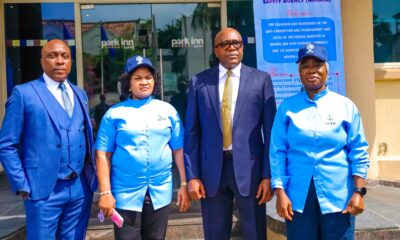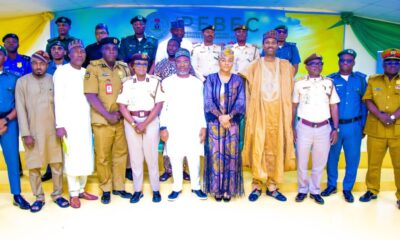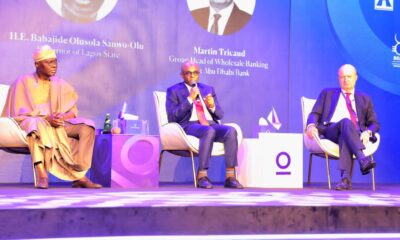Maritime
SEREC Examines FMMBE Claim Over Maritime Revenue Increase By 90%, Cautions Minister

BY GBOGBOWA GBOWA
The Sea Empowerment and Research Center (SEREC) has advised the Federal Ministry of Marine and Blue Economy and its Minister, His Excellency Adegboyega Oyetola not to be too comfortable with the well laid out projection in revenue increase for the sector but to push for complimentary efficiency quotient in the allied industry and services to boost the growth of the marine and blue economy.
To this end, SEREC urged the Minister to use his closeness to President Bola Ahmed Tinubu to prevail on the Federal Executive Council (FEC) to consider revamping the nation’s steel industry as a matter of necessity to support the expected growth of the marine and blue economy; especially in the area of ship repairs and ship building.
In a position paper with the theme “REVISITING THE HON. MINISTER FOR THE MINISTRY OF MARINE AND BLUE ECONOMY REMARKS ON THE MARINE REVENUE INCREASE BY 90%”, SEREC Head of Research, Dr. Eugene Nweke said that whereas the variables used in making the growth permutations are strong, close monitoring of policy implementation and work progress by the minister and his team is also essential for the expected results.
According to the SEREC principal officer, mere reliance on economic factors alone without the requisite leadership direction, managerial capacity and focus could produce a different outcome; since economic activities are often fraught with challenges.
The position paper written on 27th June, 2025 reads:
The claim that Blue Economy revenue has risen by 90% and will soon surpasses the Nigerian National Petroleum Company Limited (NNPC) seems plausible based on recent developments. This particular statement caught the attention of the Sea Empowerment and Research Center – SEREC, hence, it resorted to revisit and review some key indicators for real-time attestation, captured as follows:
1.0. A Preamble To Revenue Growth:
The Minister of Marine and Blue Economy, Adegboyega Oyetola, stated that revenue from the blue economy sector has increased by 90%. This growth is attributed to ongoing automation, port modernization, and technological advancements within the maritime sector. Now let’s consider the source of projections.
_a) NPA’s Revenue Projection_:
The Nigerian Ports Authority (NPA) is projecting a 40% revenue increase in 2025, targeting over ₦1.27 trillion, up from ₦894.86 billion realized in 2024. This projection is driven by comprehensive modernization efforts, activation of marine operations at the Dangote Refinery, and strategic use of cutting-edge technology.
_b) Blue Economy Potential_:
The blue economy is emerging as a critical pillar of national growth, job creation, and environmental sustainability. With continued modernization and technology adoption, it’s possible for the sector to surpass NNPC’s revenue generation.
2.0. Possible Projections:
Now let’s consider the following possible projections:
_a) Short-term_:

Given the 90% revenue growth, the blue economy might reach parity with NNPC’s revenue within the next 2-3 years, depending on the pace of modernization, technology adoption, and increased cargo throughputs.
_b) Long-term_:
The NPA predicts a 30% growth in trade volume by 2030, which could further boost the nation’s blue economy.
3.0. Likely Inherent Challenges and Opportunities:
Let’s examine the likely inherent challenges and opportunities, as follows:
_a) Infrastructure Development_:
Continued investment in port modernization and infrastructure development will be crucial to sustaining revenue growth.
_b) Technology Adoption_:
By leveraging technology to enhance efficiency and transparency, it will be essential for the blue economy to reach its full potential.
_c) Environmental Sustainability_:
Balancing economic growth with environmental sustainability will be critical to ensuring the long-term viability of the blue economy.
4.0. Exploring Complimenting Marine Sector For Accelerated Growth:
Going forward, SEREC wishes to encourage the minister to strive towards revamping the steel industry, which could boost our shipbuilding and automobile sectors, with its inherent high job creation and technological advancements.
5.0. Conclusion:
In conclusion, SEREC notes that, though the claim seems plausible, it’s essential to monitor progress and address potential challenges to ensure the blue economy reaches its full potential. The ministry’s priority should be deploying all administrative and operational arsenals towards maximizing the potential of the blue economy. As such, it is a welcome and healthy projection by a positive and optimistic working minister.
Thank you.
Fwdr Eugene Nweke Rff HOR, @ SEREC.



































